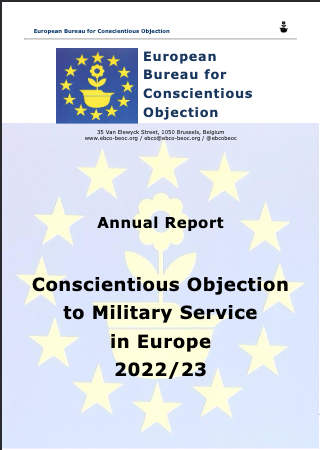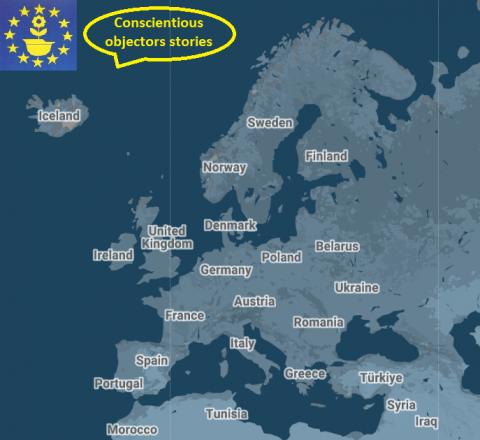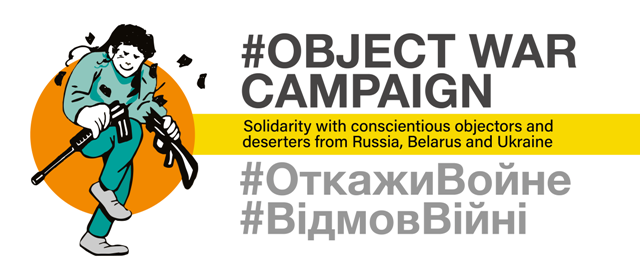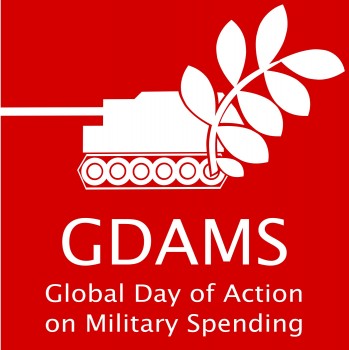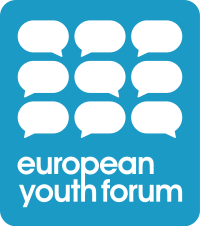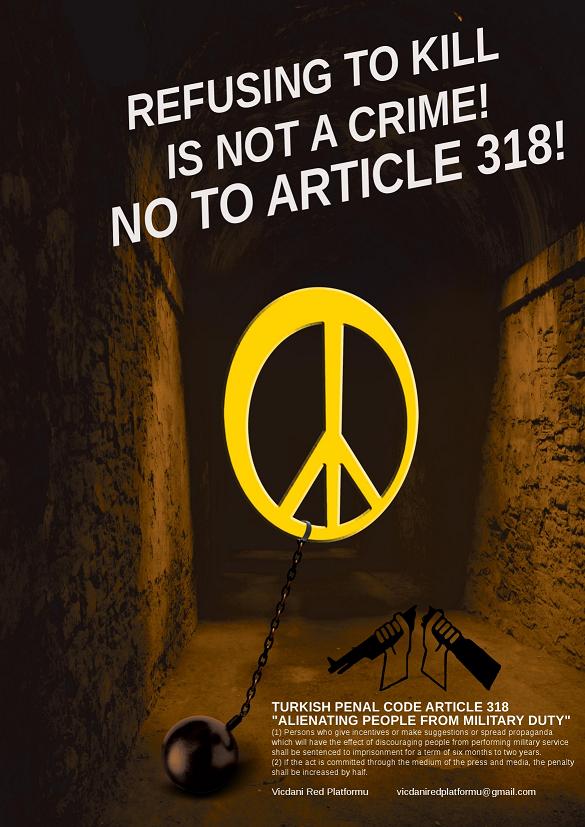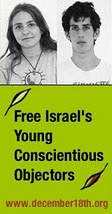Public event on World Refugee Day organised by EBCO and GFR in Athens, Greece



PRESS RELEASE
STOP THE ARMS, NOT THE REFUGEES
Event organised by EBCO and GFR on World Refugee Day
Athens, 21 June 2012
With the opportunity of the World Refugee Day 20 June and in view of the UN Conference on an Arms Trade Treaty 2-27 July 2012, the European Bureau for Conscientious Objection (EBCO) and the Greek Forum of Refugees (GFR) organised an event entitled «Stop the arms, not the refugees», with the support of the «Youth in Action» programme of the European Union. The event took place on Wednesday 20 June 2012 from 16:00 to 21:30 in the hall of the Union of Mass MediaEmployees of Athens, Greece.
The event focused on the refugees because of wars and armed conflicts and included testimonies from refugees, speeches, audiovisual shows, music play, photo exhibition and the first screening simultaneously in Brussels and Athens of the new documentary on the refugees in Greece entitled How Much Further?.
The first part of the event was entitled «Refugees: How and why being forced to become a refugee» and was coordinated by Kalliopi Lykovardi, Special Scientist of the Human Rights Sector of the Greek Ombudsperson. Giorgos Tsarbopoulos, Head of the United Nations High Commissioner for RefugeesOffice in Greece, saluted the event and underlined that an essential improvement and rationalisation of the asylum system is urgently needed for the protection of the refugees who are ‘trapped’ in Greece, and that this cannot resolve, by itself, the migration challenges, but can bring important benefits to the country. Yonous Muhammadi, President of the Greek Forum of Refugees, spoke about the reasons which force people to flee their country, and the need for refugee protection. Two testimonies were given by an Afghan woman refugee and a Somali man refugee. Angelos Nikolopoulos, General Secretary of the European Bureau for Conscientious Objection, spoke about the refusal to kill as a reason for becoming a refugee and the need for a strong Arms Trade Treaty. Two testimonies were given by two young Syrian men refugees. Giorgos Karatzas, member of the Network for the Right to Conscientious Objection of the Greek Section of Amnesty International, spoke about the human rights violations and the victims of the army in Eritrea. A testimony was given by a young Eritrean woman refugee.
The second part of the event was entitled «Refugees: Seeking shelter in Greece» and was coordinated by Dimitris Christopoulos, Assistant Professor of Panteio University, Vice President of the Hellenic League for Human Rights. Sarantis Mihalopoulos, Board Member of the Hellenic National Youth Council, saluted the event, spoke about the work of the Hellenic National Youth Council against racism and encouraged young refugees to form refugee youth organisations and join the Hellenic National Youth Council. Vasilis Kerasiotis, member of the Legal Service of the Greek Council for Refugees, spoke about the critical issues about detention and access to asylum, with special reference to the detention of minors. Efthalia Pappa, responsible of the Ecumenical Refugee Programme of the Church of Greece, spoke about the asylum system in Greece and its shortcomings.A testimony was given by a young Iranian man refugee. Spiros Rizakos,representative of AITIMA organisation, spoke about the situation and the relations between the refugees and the Greeks, being so far and so close at the same time.
The third part of the event was entitled «Refugees: How much further?»and was coordinated by Aris Hatzistefanou, journalist, radio producer, and documentary filmmaker, co-director and co-writer of "Debtocracy" and “Catastroika”.The new documentary on refugees in Greece Refugees: How Much Further? was screened for the first time. It was produced by the European Council on Refugees and Exiles (ECRE), the Greek Forum for Refugeesand the film maker Matthias Wiessler, and supported by the European Programme for Integration and Migration (EPIM).The documentary was filmed in Athens between October 2011 and February 2012, and raises the voices of those who have fled Afghanistan, Somalia or Sudan hoping to find refuge in Europe.
There were also audiovisual shows, a music play by the Afghani Association in Greece and a photo exhibition by the Iranian refugee Kusha Bahrami.
EBCO press contacts:
Angelos Nikolopoulos, EBCO’s President, +30 6947556646
Alexia Tsouni, EBCO’s Coordinator, +30 6974461210
Poster of the event:

Testimony by 21-year-old Syrian man refugee (asylum seeker in Greece under detention):
In October 2010 I went to the army training centre in Damascus, Tatayla. I had tuberculosis and they gave me postponement for one year, until November 2011. I decided not to go back to the army. They searched for me in December 2011. They came to my home, and they didn’t find me and told my parents that I had to go to the police to get my military ID. I did not. In January 2012 the police went to my house in my village. I was not there; it was the rest of the family. They went a total of 4-5 times. I was hiding in another village. But the army did dashes everywhere and you could be arrested at any time and be forced to go to the army.
If I go to the army I will kill or I will be killed. The army kills people, the army has a mandate to kill, if you don’t kill, they will shoot you. I know two children from my village who were sent to Daraa and Homs. At the time of the riots they were ordered to shoot. They didn’t shoot and they were killed. You are in danger even from the rebels if you are a soldier. They stop the buses and keep the soldiers to extort their relatives.
I left Syria in March 2012, crossed the border on foot and entered Turkey. I went to the camp of the Syrian refugees. They told me that also there, there are people dressed as civilians looking for soldiers. I arrived in Greece, almost two months ago and I was arrested. I fear that the Syrian authorities know that I am in Greece. If I go back they will put me in jail and in the military. I can not speak to my family, I cannot find them, they don’t answer the phone.
Testimony by 23-year-old Eritrean woman refugee (asylum seeker in Greece):
I come from Eritrea and belong to the Tigrinyatribe. My father was killed in 2003 because he was working for the security police of Eritrea. He was half Ethiopian from his father’s side, but we were hiding it because Eritrea has a big problem, and war with Ethiopia. My father was killed in 2003 in his work, but we do not know who killed him and why. My mother got sick and died afterwards. I have a brother whose trail I lost in 2005. I am an Orthodox Christian, as everyone in my family, and I had no opportunity to go to school.
In 2005, when I was only 16 years old, one day a neighbor told me that she saw my name on a list on the wall of a public service in the region. This list had the names of teenagers like me who had to enlist in the Eritrean army. They write your name on the walls to tell you that you have to prepare because they will come to pick you up. Five months earlier they had called up my brother who, since he went into the army, disappeared and I have never heard of him again.
Because I did not want in any way to bear a gun, let alone kill, I decided not to obey. I refused because neither my religion nor my conscience allow me to kill a human being. Moreover, I knew that if I went to the army my life would also be in risk, as I would either disappear like my brother, or be in danger. In my country women are tortured and raped in the army by men soldiers. In Eritrea there is no specific period of military service; it lasts forever. Only when you die or you fall seriously ill they return you at home. Otherwise, you never go back. I was sure that nobody would respect my objections and I knew that, if I didn’t enlist in the army, after a few days the soldiers would come and take me by force from my home, as it had happened in other cases. So I decided to flee my country.
I went from Eritrea to Sudan where I worked for two years. Then I went to Iraq and then to Syria, where I worked for three years and then to Turkey. I was six months pregnant when I tried to come to Greece. The first two times they caught me and returned me back to Turkey. In August 2011 I managed to get in. I gave birth to my son in November 2011. I had many problems in childbirth and my child suffered pneumonia when he was newborn. Luckily today my son is healthy and his father found us in Greece and we live together. If I return to Eritrea it is sure that I will be imprisoned, tortured and in the end they will kill me. Because what I did, refusing to serve in the army, is something that is not forgiven in my country.
Poster of the documentary:
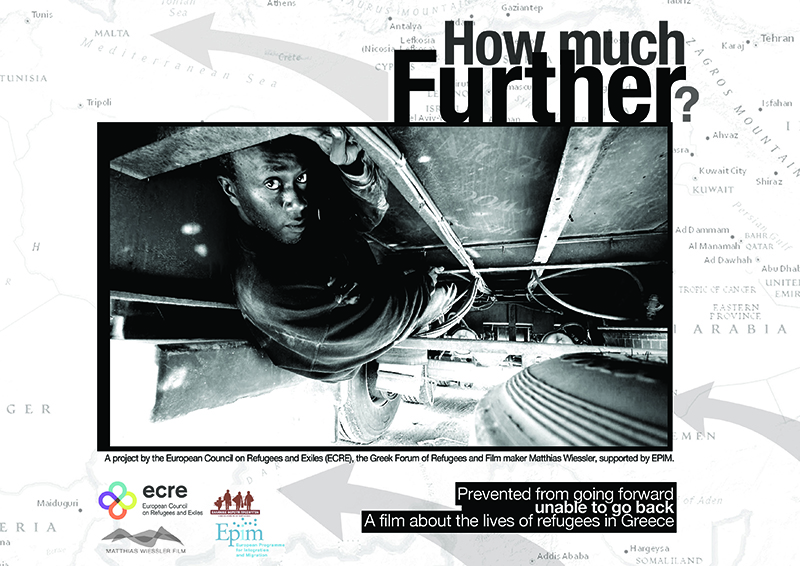
Photos of the event:
This project has been funded with support from the European Commission. This communication reflects the views only of the author, and the Commission cannot be held responsible for any use which may be made of the information contained therein.
Μελοποιημένο ποίημα Αφγανού πρόσφυγα
ΑΦΙΕΡΩΣΗ ΣΕ ΟΛΕΣ ΤΙΣ ΜΑΝΕΣ ΤΟΥ ΚΟΣΜΟΥ
Μαμά, εσύ που με χάιδευες
Μητέρα, που η αγάπη σου ήταν πάντα σωτηρία
Θυσιάζομαι για σένα, να γίνω χαλί κάτω από τα πόδια σου
Μαμά: αγάπη στην καρδιά και στο μυαλό μου
Εγώ θα θυσιαστώ για τις θυσίες που έκανες
Μαμά, ο παράδεισος για μένα, εσύ είσαι. Εσύ.
Είσαι ο Θεός στο πεπρωμένο μου
Μαμά, η ευχή σου είναι πάντα μαζί μου
Η καλύτερη ελπίδα για την αγάπη
Μαμά, είσαι Εσύ.
Τα δυο ζεστά σου χέρια, μαμά,
Είναι βάλσαμο για τους πόνους μου,
Στήριγμα μου, και σωτηρία μου.
Εσύ, που καίγεσαι σαν ένα κερί στα σκοτάδια μου
Και με που πάντα ξάγρυπνη, με περιμένεις…
Afghan refugee’spoemset to music
DEDICATION TO ALL THE MOTHERS OF THE WORLD
Mom, you who were caressing me
Mother, that your love has always been salvation
I sacrifice for you, to become carpet under your feet
Mom: love in my heart and in my mind
I will sacrifice myself for the sacrifices you made
Mom, the paradise for me, it's you. You.
You are the God in my destiny
Mom, your wish is always with me
The best hope for love
Mom, it’s You.
Your two warm hands, mom,
It is balm for my pains,
My stand, and my salvation.
You, who burn like a candle in my darkness
And that always sleepless, you wait for me...



Invitation to the event
STOP THE ARMS, NOT THE REFUGEES
WORLD REFUGEE DAY
Wednesday 20 June 2012, Athens
With the opportunity of the World Refugee Day 20 June and in view of the UN Conference on an Arms Trade Treaty 2-27 July 2012, the Greek Forum of Refugees (GFR) and the European Bureau for Conscientious Objection (EBCO) will co-organise an event entitled «Stop the arms, not the refugees», focusing on the refugees because of wars and armed conflicts. The event will include testimonies from refugees, speeches, audiovisual show, photo exhibition, music show and the first screening simultaneously in Brussels and Athens of the new documentary on the refugees in Greece entitled How Much Further?, produced by the European Council on Refugees and Exiles (ECRE), the Greek Forum for Refugees and the film maker Matthias Wiessler, and supported by the European Programme for Integration and Migration (EPIM). The documentary was filmed in Athens between October 2011 and February 2012, and raises the voices of those who have fled Afghanistan, Somalia or Sudan hoping to find refuge in Europe.
The event will take place on Wednesday 20 June 2012 from 16:00 to 21:30 in the hall of the Union of Mass MediaEmployees of Athens (20 Akadimias str, Athens).
It will be our pleasure if you honour us with your presence.
Sincerely yours,
Yonous Muhammadi Angelos Nikolopoulos
President of the Greek Forum of Refugees General Secretary of EBCO
Contact cell phone number 6948408928 Contact cell phone number 6947556646
The Greek Forum of Refugees is a multinational network of refugees organisations which was founded in Athens in 2010 with founders members the Afghani Association in Greece, the Sudanese Refugees League in Greece, the Somali Community in Greece and the Greek Forum of Migrants. Its goal is to create a viable constitution that will unite all refugees living in Greece through a joint course of action, providing assistance to refugees during the difficult and time-consuming procedure of being granted asylum, protecting their rights and helping their integration into the greek society.
The European Bureau for Conscientious Objection was founded in Brussels in 1979 for theprotection of the right to conscientious objection and the right to international protection for refugees, and the promotion of peace, non violence and human rights education. It enjoys participatory status with the Council of Europe since 1998 and is a member of its Conference of International Non-Governmental Organisations since 2005. It provides expertise and legal opinions on behalf of the Directorate General of Human Rights and Legal Affairs of the Council of Europe. It is involved in drawing up the annual report of the Committee on Civil Liberties, Justice and Home Affairs of the European Parliament since 1994. It is a full member of the European Youth Forum since 1995.
Programme of the event
STOP THE ARMS, NOT THE REFUGEES
WORLD REFUGEE DAY
Wednesday 20 June 2012, Athens
1st part: REFUGEES: HOW AND WHY BEING FORCED TO BECOME A REFUGEE
Coordination: Kalliopi Lykovardi, Special Scientist of the Human Rights Sector of the Greek Ombudsperson
16:00-16:10 Salutation by Giorgos Tsarbopoulos, Head of the United Nations High Commissioner for RefugeesOffice in Greece.
16:10-16:20 The need for refugee protection, Yonous Muhammadi, President of the Greek Forum of Refugees.
16:20-16:30 Testimony of Afghan woman refugee.
16:30-16:40 Testimony of Sudanese refugee.
16:40-16:50 Testimony of Somali refugee.
16:50-17:00 The refusal to kill as a reason for becoming a refugee and the need for a strong Arms Trade Treaty,Angelos Nikolopoulos, General Secretary of the European Bureau for Conscientious Objection.
17:00-17:05 Testimony of Syrian refugee.
17:05-17:15 Testimony of Kurdish refugee.
17:15-17:25 The human rights violations and the victims of the army in Eritrea, representative of the Network for the Right to Conscientious Objection of the Greek Section of Amnesty International.
17:25-17:30 Testimony of Eritrean woman refugee.
17:30-17:40 Testimony of Eritrean man refugee.
17:40-18:10 Questions – interventions.
18:10-18:20 Break.
2nd part:REFUGEES: SEEKING SHELTER IN GREECE
Coordination: Dimitris Christopoulos, Assistant Professor of Panteio University, Vice President of the Hellenic League for Human Rights
18:20-18:30 Salutation by Armodios Drikos, President of the National Youth Council.
18:30-18:45 Critical issues about detention and access to asylum, Vasilis Kerasiotis, member of the Legal Service of the Greek Council for Refugees.
18:45-19:00 The asylum system in Greece, Efthalia Pappa, responsible of the Ecumenical Refugee Programme.
19:00-19:10 Testimony of Iranian refugee.
19:10-19:20 Greeks and refugees: so far, so close, Spiros Rizakos,representative of AITIMA organisation.
19:20-19:50 Questions – interventions.
19:50-20:00 Break.
3rd part: REFUGEES: HOW MUCH FURTHER;
Coordination: Aris Hatzistefanou, Journalist, Member of the Union of Mass Media Employees of Athens
20:00-20:40 First screening of the new documentary on refugees in Greece entitled How Much Further?,produced by the European Council on Refugees and Exiles (ECRE), the Greek Forum for Refugees and the film maker Matthias Wiessler, and supported by the European Programme for Integration and Migration (EPIM).
20:40-21:00 Discussion.
21:00-21:30 Music show by the Afghani Association in Greece.
The documentary How Much Further?, which was filmed in Athens between October 2011 and February 2012, in the midst of social, political and economic turmoil, raises the voices of those who have fled Afghanistan, Somalia or Sudan hoping to find refuge in Europe. After months or even years on the road, they arrive in Greece, a country whose population is facing the full brunt of the economic crisis and where the asylum and reception systems are completely dysfunctional. Most people see no option but to take to the road again in the hope of reaching a country that can receive them and consider their claim for asylum. But, once they have entered Greece, it is extremely difficult if not impossible to leave the country given the European policies that legally bind them to Greece.
This documentary is the fruit of the cooperation between the European Council on Refugees and Exiles (ECRE), the Greek Forum for Refugees and the film maker Matthias Wiessler, and supported by the European Programme for Integration and Migration (EPIM).
This project has been funded with support from the European Commission. This communication reflects the views only of the author, and the Commission cannot be held responsible for any use which may be made of the information contained therein.

